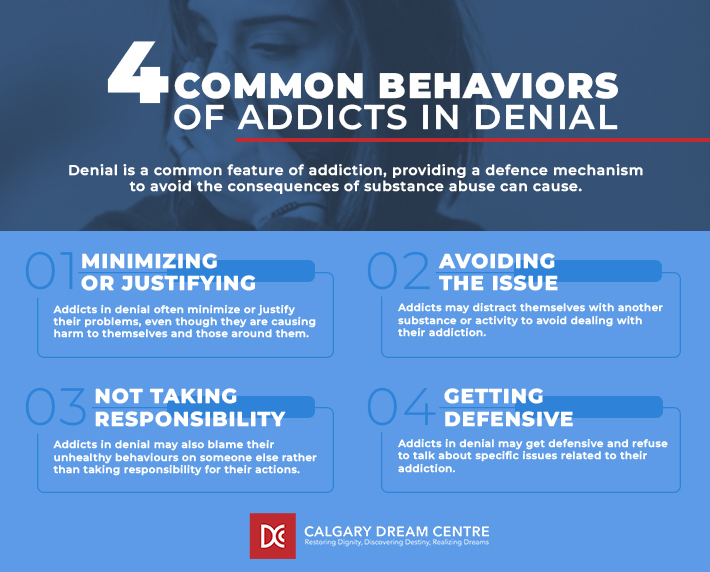As a family member of someone experiencing addiction, watching them refuse to acknowledge their problem can be frustrating, heartbreaking and even infuriating.
Addiction can cause people to lose sight of the truth, leaving them unaware of their behaviour’s negative impact on themselves and those around them. However, with guidance for addiction, it is possible to help a loved one break through their denial and begin a journey toward recovery.
You can support your loved one in denial about their addiction by approaching them with empathy and understanding, encouraging them to consider addiction recovery programs, and seeking support for yourself.
What Is Denial?
Denial is a defence mechanism in which individuals unconsciously avoid facing facts that can cause emotional pain or discomfort. While denial may offer temporary relief, it can have long-term consequences on mental health, social relationships, and overall well-being.
Denial can manifest in many ways, including denial of addiction, denial of illness, denial of abuse, and denial of responsibility. People in denial typically resist any information that contradicts their beliefs or attitudes.
For example, someone may insist that they don’t have a substance abuse problem despite it interfering with their job or family life.

How Are Denial & Addiction Related?
Denial can be part of addiction and take many forms. Some people deny they have a problem with substance abuse altogether, while others may admit there is an issue but refuse to accept that their behaviour is causing harm.
Addiction can be a source of shame, self-hatred, and low self-worth. For many addicts, the fear of facing the negative consequences of their actions can be overwhelming, leading them to believe that everything is under control.
Here are some other common behaviours often exhibited by people in denial:
Minimizing or Justifying Behaviours
Denial can create a distorted reality in which the severity of an addiction is downplayed or even ignored entirely. Those in denial about addiction may minimize or try to justify their behaviour, even though they may be causing harm to themselves and those around them.
Avoiding the Issue
Another sign of denial is avoiding thinking about problems. Those experiencing addiction may distract themselves with another substance or activity to avoid dealing with their addiction. It’s essential to help them recognize this behaviour and encourage them to confront their issues head-on.
Avoiding Responsibility
People in denial about their addiction may also blame their unhealthy behaviours on someone else rather than taking responsibility for their actions. While external factors can play a role in addiction, it’s crucial to help those experiencing addiction recognize that they have the power to control their actions and decisions.
Getting Defensive
Lastly, people in denial about their addiction may get defensive and refuse to talk about specific issues related to their addiction. They may feel shame or embarrassment and fear being judged or misunderstood. Creating a supportive, non-judgmental environment where they can feel comfortable opening up about their struggles is important.
How Can You Help a Loved One In Denial?
It can be challenging for family members to watch a loved one live in denial, especially if they struggle with addiction. However, it can be helpful to remain empathetic and offer support where it may be needed. The role of family in addiction can be crucial for recovery.
Approach with Empathy & Understanding
The first step in supporting a loved one in denial about their addiction is to approach them with empathy and understanding.
It can be easy to get frustrated or angry when you see someone living in denial, but it is important to remember that addiction is a disease, and your loved one may feel ashamed and alone. Reach out to them and let them know you care about them and can support them through their journey.
Encourage Them to Seek Help
Denial can prevent individuals from seeking help for their addiction, so it’s crucial to encourage them to seek help for addiction recovery. Offer to make an appointment with a therapist or a doctor—or help your loved one find a recovery organization. You can also suggest attending a support group where they can meet others struggling with similar issues.
Seek Support
Supporting a loved one through addiction can be an emotional and stressful process. Finding the right support for yourself and your family is crucial. Consider attending an education session on addiction, speaking with a therapist, or joining a support group to help you and your family understand and cope with addiction.
Take Care of Yourself
It can be easy to feel overwhelmed by your loved one’s addiction and neglect your own health and well-being. Remember that you must take care of yourself to be able to help someone else effectively. Take time for yourself and engage in activities that support your well-being, whether that be through exercise, hobbies, or therapy.
How to Talk to a Loved One About Their Addiction
It’s important to educate yourself about addiction and mental illness. Understanding what a loved one experiencing addiction may be going through can help you communicate with them more effectively.
Once you feel confident in your knowledge of addiction, it’s time to talk to your loved one. It’s crucial to approach the conversation with sensitivity and empathy. Avoid repeatedly urging, pleading, or threatening your loved one. Instead, use “I” statements to express your concern. Focus on your thoughts and feelings rather than directly criticizing your loved one’s behaviours. This approach can help them feel less defensive and more receptive to your message.
Encouraging your loved one to seek support is also crucial. Suggest they see their family doctor or make an appointment at a recovery centre. Provide them with resources such as support groups or therapy options, and encourage them to get started on the road to recovery.

Addiction Support from Calgary Dream Centre
Helping a loved one break through denial and get started with addiction recovery can be challenging and emotionally draining. However, with patience, empathy, and support, it is possible to help them see the truth and take the first steps towards recovery.
If you or a loved one are ready to take the next step toward recovery, contact us at Calgary Dream Centre. Recovery can’t be standardized—that’s why we offer recovery programs and services unique to each individual. Find help today.



